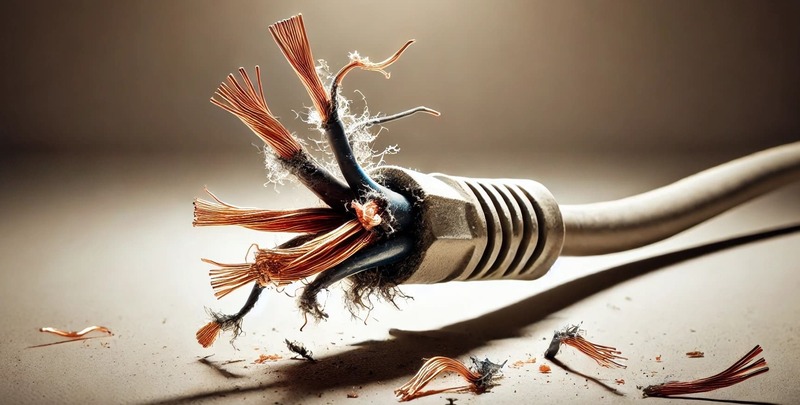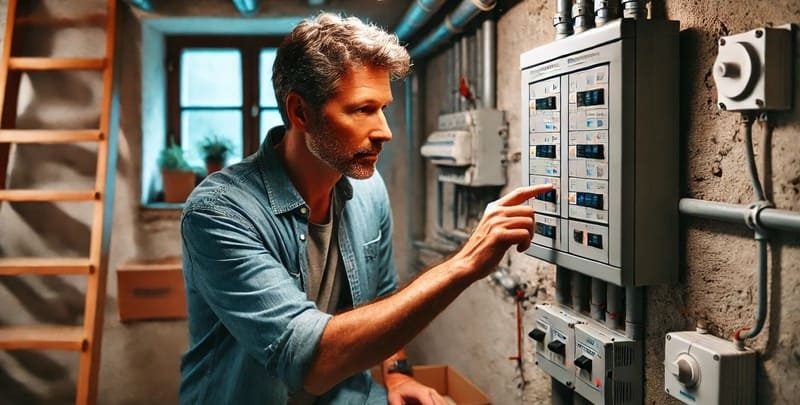Exposed wires in your home are more than just a visual nuisance — they can be extremely dangerous. Whether due to aging wiring, improper DIY work, or general wear and tear, exposed electrical lines pose serious risks to your safety and property. From electric shocks to fire hazards, leaving wires exposed can lead to life-threatening situations. Many people don’t realize how quickly a small issue can turn into a major problem. It’s essential to address these issues as soon as they’re discovered to avoid accidents, costly repairs, or even legal consequences if local codes are violated. In this article, we’ll take a closer look at the dangers of exposed wires and what you can do to protect your family and home. When it comes to electricity, safety should always be your top priority. Exposing live wires in your home is one of the most dangerous mistakes you can make. Electrical shocks from exposed wires can cause severe burns, injuries, or even death. This risk is especially high for children and pets who may not understand the danger. Here are some key points to consider: If you spot any exposed wires, don’t ignore them. Addressing the issue immediately can prevent serious harm to your family and loved ones. One of the most dangerous outcomes of exposed wires is the risk of fire. Damaged or frayed wires can spark, especially when they come into contact with flammable materials like wood, paper, or fabric. These sparks can ignite a fire that spreads quickly and becomes difficult to control. Many homeowners are unaware that wiring problems are a leading cause of house fires. According to fire safety reports, faulty wiring contributes to thousands of residential fires each year. If wires are hidden behind walls or under flooring, it can be hard to detect the issue until it's too late. To reduce the risk, it's important to regularly inspect your home's wiring and have a licensed electrician repair any issues right away. Prevention is always better than dealing with the aftermath of a fire. Exposed wires can also lead to short circuits, which can damage your appliances and electrical systems. A short circuit happens when two wires touch, causing an unexpected flow of electricity. This can lead to overheating, tripped breakers, or even fires. Here’s what you need to know: Fixing exposed wires promptly can help prevent these costly and inconvenient problems. Regular inspections by a professional can also keep your home’s electrical system running smoothly. Exposure to water dramatically increases the risk of electrocution. In areas like bathrooms, kitchens, or outdoor spaces, where moisture is common, exposed wires become a major hazard. Water conducts electricity, so even a small amount near a live wire can be deadly. Simple things like a dripping faucet or a splash of water near a damaged wire can create a dangerous situation. In homes with poor insulation or outdated wiring, the risk is even greater. This is why it's critical to fix exposed wires in wet areas as soon as possible. Installing Ground Fault Circuit Interrupters (GFCIs) can add an extra layer of protection, but the best solution is to ensure all wiring is properly insulated and maintained. Ignoring exposed wires isn’t just unsafe — it can also lead to legal trouble. Electrical codes exist to protect both property and people, and failing to follow them can result in fines, penalties, or even liability in case of an accident. As a homeowner, you're responsible for maintaining safe electrical systems. If a fire or injury occurs due to neglected wiring, you could face serious legal consequences. This is especially true if you're selling your home — potential buyers or inspectors will likely flag exposed wires, which can delay the sale or lower your home’s value. In rental properties, landlords are legally required to provide a safe living environment. Exposed wiring can lead to tenant complaints, legal action, or even eviction in extreme cases. To avoid these issues, always call a licensed electrician to fix any exposed wires. Staying compliant with electrical codes helps protect your home and your legal standing. If you find exposed wires in your home, it’s important to handle the situation carefully to avoid injury. Here’s what you should do: By taking these steps, you can significantly reduce the risk of electrical shocks, fires, and other hazards in your home. Exposed wires are not something to be ignored. They can lead to serious injuries, fires, and costly damage. Taking the time to identify and fix these issues is crucial for keeping your family safe and your home secure. Regular inspections of your electrical system can help catch problems early, preventing them from becoming bigger issues down the line. If you ever come across exposed wires, don’t try to fix them yourself — always call a licensed electrician. Electricity is powerful, and when mishandled, it can be deadly. By staying informed and proactive, you can protect your home and loved ones from unnecessary risks. Please note: This information is for general guidance only. Regulations vary by location, so please consult local authorities or a qualified professional before making any changes. See our Terms & Conditions for more details. Pva Fiber,Polyvinyl Alcohol Fiber,Wanwei Pva Fiber,Sinopec Pva Fiber Saint Petrochemicals Limited , https://www.saintpec.comThe Hidden Dangers of Exposed Wires
Electrical Shocks and Burns: A Real Threat

Fire Hazards: The Risk of Electrical Fires
Short Circuits and Equipment Damage
Electrocution Risks in Wet Areas
Legal and Regulatory Consequences

How to Safely Handle Exposed Wires
Safety First: Protect Your Family and Home